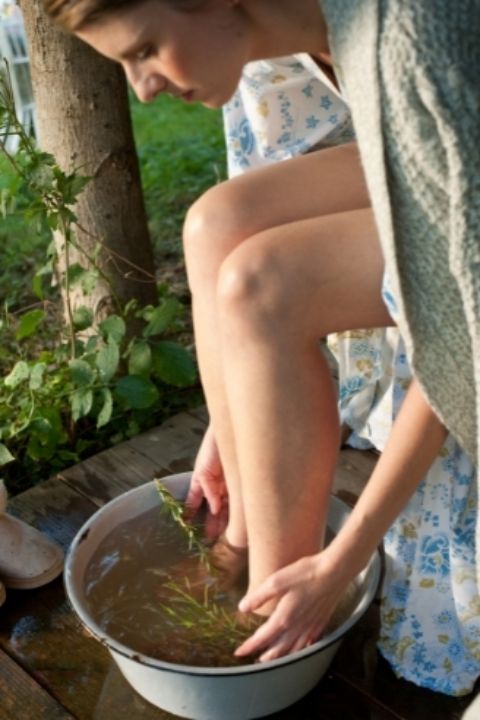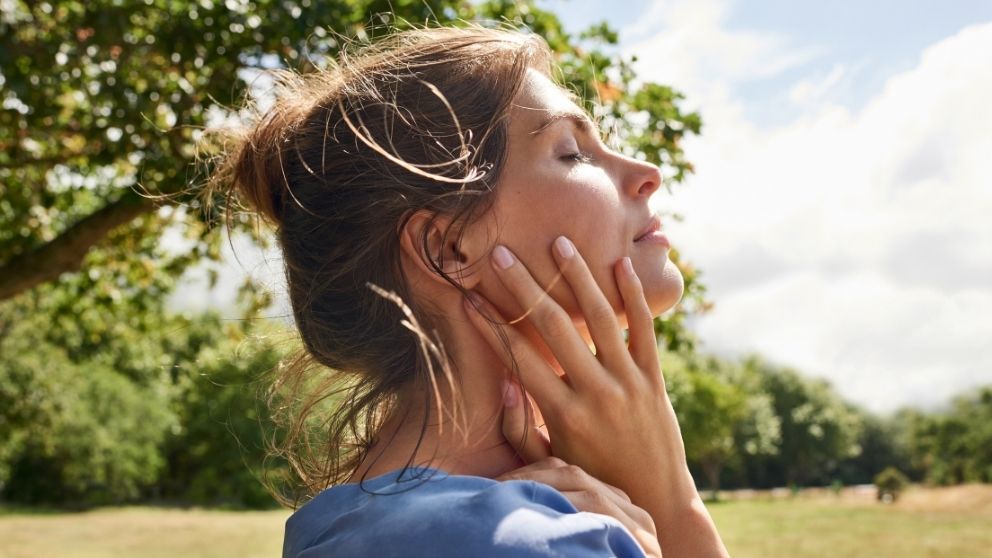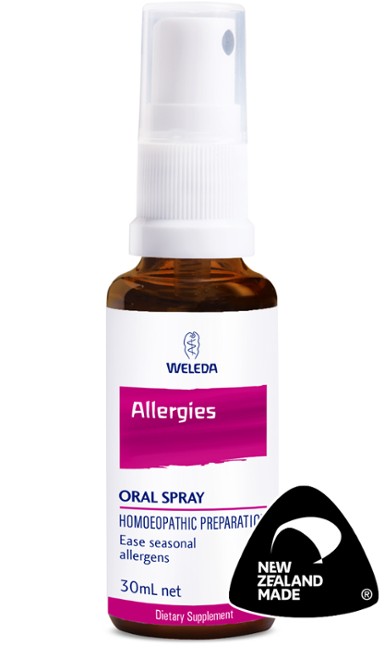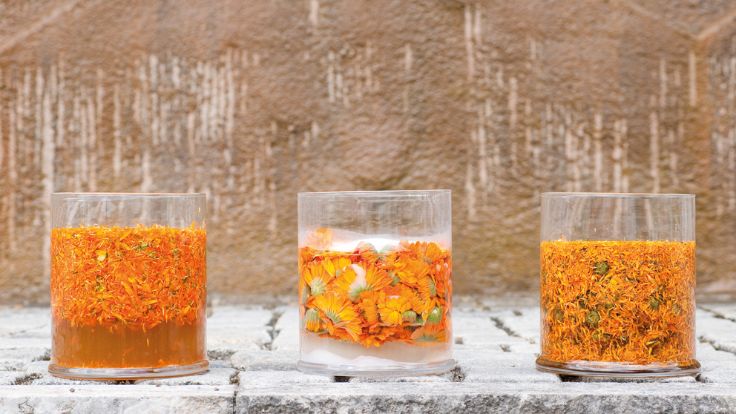
Natural help for Hayfever
Tips from Weleda's Integrative Health Consultant, Dr Rosy Daniel
Find out about symptoms, remedies and how to best protect yourself during Hayfever season
How to cope effectively with Hayfever
Whilst some of us look forward to the Spring sunshine, for others this time of year heralds the start of an annual nightmare of sneezing, runny noses, headaches and itching eyes as the buds burst open and the pollen flies. If this is you, my heart goes out to you! Here are several things that you can do to lower the impact of the pollen and cope effectively with Weleda’s natural remedies.
What causes Hayfever symptoms?
It is useful to understand how the tissues of our noses work. The tissue inside our noses is erectile, and it can become engorged with blood if triggered by irritants and allergens, and block our nose. This is a first line defence system to prevent substances getting into the lungs that our bodies are allergic to. I see people blowing their noses harder and harder to try and clear this ‘blockage’, assuming that it is being caused by mucus. When this happens, we are making things worse, not better, and we must look for help from a different direction.
The swollen tissues will shrink back if we apply cooling liquids. Absolutely ideal here is Weleda’s Rhinodoron Nasal Spray, which both cools and soothes the mucus membranes with a gentle spray of saline containing organic aloe vera, which is renowned for its healing properties for mucus membranes.
If you wish to go further, you can adopt the yogic practice of washing the nasal passages and sinuses with saline, a great source of relief if your nose and sinuses get really swollen. For this you need a Neti pot, used for nasal irrigation. Effectively fluid is poured into one nostril and then flows out through the other nostril or mouth. You can find helpful instructions on the internet from yoga teachers to learn how to do this properly.
Natural Hayfever Remedies
Many people also turn to homeopathy to manage or ward off hayfever symptoms. Below, Weleda UK Pharmacist Evelyn Liddell suggests several gentle remedies to help prevent and cope with all the symptoms of hayfever or allergic rhinitis.
In my view it is so much better to use natural remedies for hayfever, as many conventional medical treatments have shortcomings. Treatments usually revolve around nasal sprays which temporarily constrict the blood vessels in our nasal tissues. This does initially cause a decongestant effect, which unfortunately wears off, often with a re-bound congestion effect that can be worse than the original problem. Or we can be offered steroid nasal sprays designed to dampen down the immune response. This can work well in the short term, but longer term, steroids can have side effects, lowering our resistance to infection and interfering with our own steroid and hormone production. The other main treatment is anti-histamine tablets, which can make us feel drowsy and irritable.
What can we do to prevent or treat Hayfever?
First, you need to be aware of what is affecting your allergic threshold. Did you know that how we react to allergens changes according to our mood and stress levels, the level of exposure to the allergen, and the other levels of toxicity or infection going on in our bodies? So, in effect, if we are stressed and upset then our allergic threshold is lowered, meaning we have symptoms at lower levels of exposure. Also, as we become exposed to allergens our body learns the immune response, so over the weeks, it takes less and less to set us off. For example, in August it might take 50 grains of pollen to make us sneeze, but by November, when our system is fully sensitized, it might only take 1.
Lifestyle tips to help ease Hayfever symptoms
Furthermore, if our systems are already challenged with mucus-producing foods, toxins from heavy foods, foods to which your system is intolerant, alcohol, chemicals and drugs, our immune system may well be far more reactive. Infections with colds, bugs or candida will also make things worse. So, my advice here is:
- Work to reduce your stress levels, particularly as we approach the pollen season. Lowering adrenaline levels in your system will make you far less reactive. Adopt yoga practices, relaxation, meditation or mindfulness techniques.
- Release difficult emotions with the help of Emotional Freedom Technique. Notice if there are places where your symptoms are worse – around a particular person, set of dynamics or memories. This is a sure sign that there is an emotional trigger that is lowering your allergic threshold. So, identify your triggers and take steps to avoid them or better still, to heal these issues.
- Reduce exposure to pollen as much as you can. This means avoiding walking through long grasses, and under trees that are in flower. You will also be helped by using an air filter in the rooms where you sleep and work to keep the air pure.
- Breathing in the vapour from a Weleda Bath Milk is very soothing mentally and for the sinuses and nasal passages. Additionally, diffusing aromatherapy oils which are calming, and which ease congestion, can really help. Gently humidifying the air around you in this way can bring down pollen levels nicely.
- It is also a good idea to avoid mucus-producing foods. Common culprits are animal milk-based foods – milk, cheese, yoghurt, cream, ice cream - or wheat-based products, and in general eating too much protein as eggs, fish or meat. So, stick to light vegetable-based meals such as salads, stir fries, juices and fruits during the pollen season.
- You may wish to go further and check if you have food intolerances. This involves getting an IgG blood test from a good health lab to show you any foods to which your body has a reaction. When we suffer from food intolerances, this can cause swelling of our mucus membranes including the nose and sinuses. So that might well be an extra factor for you that could be eliminated.
- Another aggravating problem can be if you have chemical sensitivities, either single or multiple. A good health lab can help you find out if you have sensitivities to perfumes, household chemicals, petrol, diesel and substances used in gardening or DIY activities. In general, the Weleda way involves avoiding these chemicals and going 100% natural with our skincare, beauty and body care. Stepping this up during the pollen season can only help!
- Improve your nutrition overall with a low acid way of eating. If we are acidic then all inflammatory processes are increased. Check your salivary pH with litmus paper first thing on getting up, before any food, drink or tooth brushing. You are aiming for 7.4. If lower than this, pay attention to leaving out the most acidic things such as wine, beer, cider, fruit juices, tomatoes, black tea and coffee, sour fruits, vinegar and pickles. You can start taking these things in moderation again when you regain your pH balance.
- Also learn yogic breathing techniques such as alternate nostril breathing. Do your practice in the evenings when pollen counts are low and use this beautiful ancient technique to balance your nervous system and prepare you for deep meditation or a great night’s sleep.
- Be gentle with yourself – take note of the fact that your body is struggling and take on less. Make time to focus on your wellbeing or reading and creative pursuits that you usually don’t have time for.
The big question of course if whether we can eliminate our problem altogether through de-sensitisation techniques. Personally, I have heard of people who have been released from hay fever altogether through NAET technique. This stands for Nambudripad Allergy Elimination Techniques. This involves in depth testing for triggers and the systematic reversal of this patterning. If you are at your wits end and really want to try and rid yourself of the problem altogether, then look for a practitioner.
Weleda has a range of natural products to support you through the Hayfever season.
Allergies Oral Spray - Supports the body's response to seasonal allergens.
Gencydo Hayfever Nasal Spray - Supports the nasal passages during exposure to seasonal allergens.
Hayfever & Sinusitis Drops - Relieves the symptoms of hayfever, such as runny, itchy nose as well as painful sinus conditions.
Rhinodoron Nasal Spray - Moisturises, cleans and cares for dry nasal passages. Rhinodoron, with Aloe vera gel, moisturises, cleans and cares the nasal passages, particularly when they are dry.
Rosemary Invigorating Bath Milk - Wake up and revive your senses while you bathe. Distilled energy and life in stimulating essential oil of rosemary. Soak it in while you cleanse in this fragrant bath milk.
Always read the label and use only as directed. Consult a healthcare professional if symptoms persist. Weleda, Havelock North. TAPS PP8056.
















